 Petzlover
Petzlover Cymric is originated from United Kingdom but Munchkin is originated from United States. Both Cymric and Munchkin are having almost same weight. Both Cymric and Munchkin has same life span. Cymric may have less litter size than Munchkin. Cymric requires Moderate Maintenance. But Munchkin requires Low Maintenance
Cymric is originated from United Kingdom but Munchkin is originated from United States. Both Cymric and Munchkin are having almost same weight. Both Cymric and Munchkin has same life span. Cymric may have less litter size than Munchkin. Cymric requires Moderate Maintenance. But Munchkin requires Low Maintenance
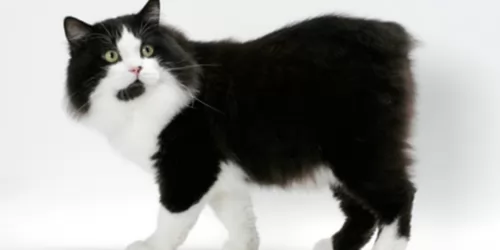 The Cymric is a naturally tailless cat although having said that, not every Cymric is completely tailless.
The Cymric is a naturally tailless cat although having said that, not every Cymric is completely tailless.
It’s actually a long-haired Manx cat this and thought to date back to 1750. It is one of the oldest cat breeds.
Known also as rumpies or stumpies, the taillessness of the Manx an Cymric started as a mutation among the island's domestic cat population. Long-haired kittens were born to Manx cats on the Isle of Man, but in the 1960s, similar kittens were born in Canada and then specifically bred.
The Cymric became popular, even though it took years for the Cymric to be recognized as a breed of its own by cat associations. The International Cat Association (TICA) gave the cat breed status in 1979.
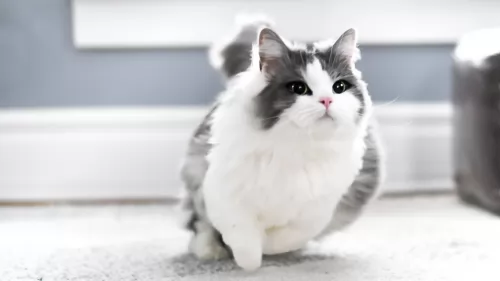 Information about the short-legged Munchkin cat has been around since the 1940s. A British veterinary report in 1944 noted these short-legged cats.
Information about the short-legged Munchkin cat has been around since the 1940s. A British veterinary report in 1944 noted these short-legged cats.
During the 2nd World War, the cats disappeared but other short-legged cats were seen in Russia during 1956 and then the United States in the 1970s.
The cat was introduced to the general public in 1991 but for many years it wasn't accepted in cat competitions. Eventually, the Munchkin was proposed as a new breed by foundation breeders and accepted by TICA into its New Breed development program in 1994. The Munchkin breed achieved TICA Championship status in May 2003. The Cat Fanciers Association doesn’t recognize the Munchkin.
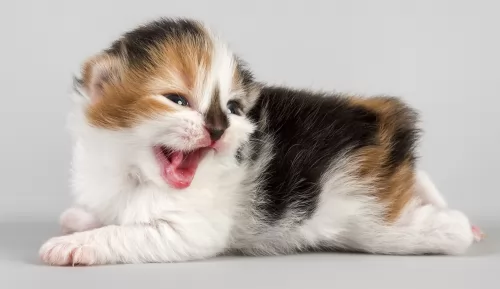 The Cymric is a medium-sized cat that can weight between 4 and 6kg and he is round in shape and stockily built. The back legs are also longer than the front legs.
The Cymric is a medium-sized cat that can weight between 4 and 6kg and he is round in shape and stockily built. The back legs are also longer than the front legs.
He has a short, arched back with a broad rump. The unusual but beautiful Cymric has long hair and a thick double coat that is glossy and vibrant. Some cymrics have tufts of hair on their ears and toes.
All colors of the coat are available and it can be solid or patterned - white, blue, red, black, cream, tortoiseshell etc.
The eyes are large and can be green, copper, or yellow. The ears are widely spaced with rounded tips.
The Cymric is described as a sweet-natured, placid cat that doesn’t get ruffled over much, though he does get excited about his human family.
He tends to be reserved around strangers. He is a loving cat and simply loves being around his human family. He is a strong cat and intelligent too and he is quite capable of watching you and then learning how to open doors and get into cupboards.
He is sociable and talkative too and enjoys ‘talking’ to you, especially when he has attached himself to one member of the family. He thrives on his human family's company and is a cat that provides lots of entertainment for you. Even though he becomes attached to one family member, he gets on well with children and pets in the home.
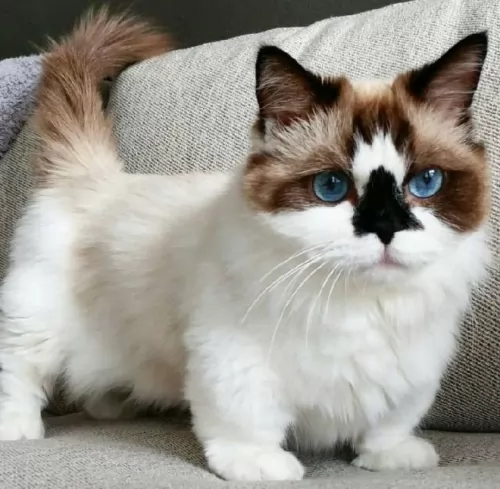 The Munchkin is a small to medium-sized, muscular cat with a thick coat that comes in all colors and patterns. In fact, color, pattern, and coat length will vary.
The Munchkin is a small to medium-sized, muscular cat with a thick coat that comes in all colors and patterns. In fact, color, pattern, and coat length will vary.
There is also a long-haired variety. It usually weighs between 3 and 4kg. It has short, stubby little legs and a torso that hangs fairly low to the ground. The cat’s back legs are somewhat longer than the front legs. The legs of these cats can be slightly bowed. The eyes can be any color.
The Munchkin is such a social, outgoing cat that just loves being petted and pampered by his human family. He is sociable and friendly as well as intelligent and is easy to train. While he is an amicable cat and can get on well with everyone in the family, it isn’t a good idea to have such a cat as a playmate for children as they can become injured.
An interesting feature with this cat is the way he doesn’t really sit like other cats but has a way of sitting up on his legs, much like a rabbit.
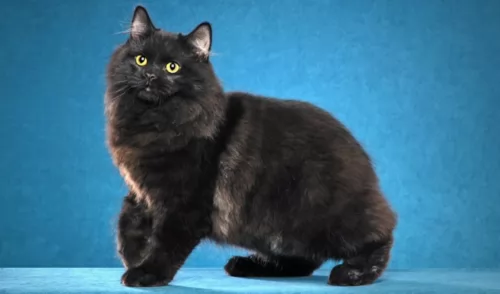 Yes, the Cymric has quite a few health issues but many people choose to overlook these as they love the personality of the lovable cat breed.
Yes, the Cymric has quite a few health issues but many people choose to overlook these as they love the personality of the lovable cat breed.
It’s such an intelligent cat too but best of all it offers total love and companionship.
It is certainly an unusual domesticated cat breed that appeals to many different people and it is guaranteed that you’ll also find him one hang of a feline pet.
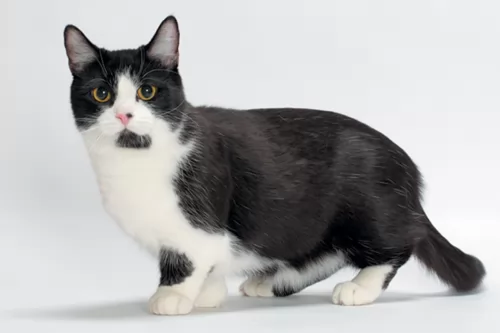 The Munchkin may be short and stock but he is just as active and playful as any other cat. When you have him in your home, you'll discover that his short little legs don't stop him from trying out everything other cats do.
The Munchkin may be short and stock but he is just as active and playful as any other cat. When you have him in your home, you'll discover that his short little legs don't stop him from trying out everything other cats do.
He is ready to show you what he's made of. He is a confident, social cat and is friendly, intelligent, and loving towards his human family. He makes a devoted companion and he will get along with other cats in the family as well as dogs.
He may be a bit odd to look at but if you want an excellent companion, the Munchkin is well worth your consideration.
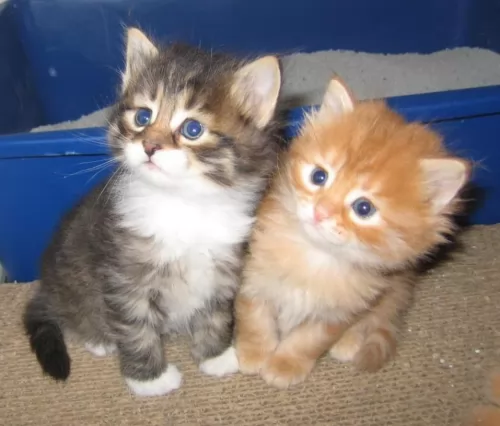 If you look after your Cymric well, he can live to a good age of up to 15 years. The lack of a tail is a genetic defect and the cat’s deformed spine can cause health problems including arthritis.
If you look after your Cymric well, he can live to a good age of up to 15 years. The lack of a tail is a genetic defect and the cat’s deformed spine can cause health problems including arthritis.
In fact, the cat’s lack of a tail causes some serious diseases. The defective gene responsible for the loss of the tail affects the spine and can actually cause spinal problems. In fact, when completely tailless Manx cats mate, the defects can be so severe that some of the offspring are born dead.
People often speak of these health issues of the cat as the Manx Syndrome.
Some cats have a narrowing of the anal passage and this can lead to bowel blockages. Make sure to get your Cymric vaccinated against deadly cat illnesses and ensure veterinary checks for parasite control and illness.
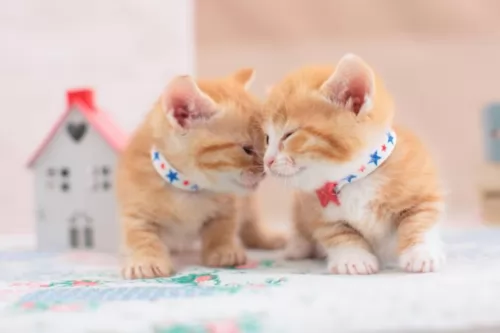 Because this is a fairly new breed, it's still not too clear about its health. It was once thought that the Munchkin cat could develop spinal problems because of its short legs.
Because this is a fairly new breed, it's still not too clear about its health. It was once thought that the Munchkin cat could develop spinal problems because of its short legs.
It was in 1995 that some breeders had some of their older Munchkins x-rayed to see if there were any signs of joint or bone problems, but none were found.
The Munchkin cat should also be vaccinated as a kitten and be treated for parasites. To ensure the good health of your sweet little Munchkin cat, give him the best diet possible.
In fact, if you take good care of your Munchkin and you make sure to get all the necessary vaccines for him and get him to the vet when he shows signs of illness, your munchkin can reach 12 to 15 years of age.
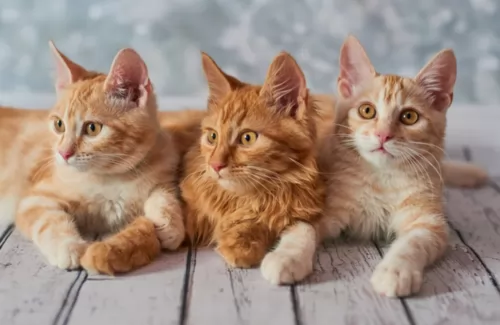 As a kitten, provide your Cymric with food appropriate to its age. Once your cat turns one, you can start feeding him adult cat food. There are a whole lot of excellent commercially manufactured cat foods – dry and canned foo – but always choose a high-quality one where the first ingredients listed are always meat. This is because the cat is a carnivore. Make sure the food has taurine, which is an essential amino acid for cats.
As a kitten, provide your Cymric with food appropriate to its age. Once your cat turns one, you can start feeding him adult cat food. There are a whole lot of excellent commercially manufactured cat foods – dry and canned foo – but always choose a high-quality one where the first ingredients listed are always meat. This is because the cat is a carnivore. Make sure the food has taurine, which is an essential amino acid for cats.
This cat has a thick coat and he will need a brush at least twice a week, especially as he is a high shedding cat. While you brush your cat, look out for any problems such as red areas, hair loss, sores or irritated skin. Take note of any unusual lumps.
Some people take their Cymric to the vet once a year for a routine medical check-up. They have the nails clipped and the ears and teeth checked. It is also a great way to get your queries answered on the nutritional and health needs of your pet.
You will need to have your Cymric’s nutrition checked to keep him in tip-top condition. The Cymric cat has a good appetite and his build can allow him to put on weight easily. Obesity can put pressure on the spine and lead to all kinds of joint problems.
Provide your cat with a litter box and keep it immaculately clean.
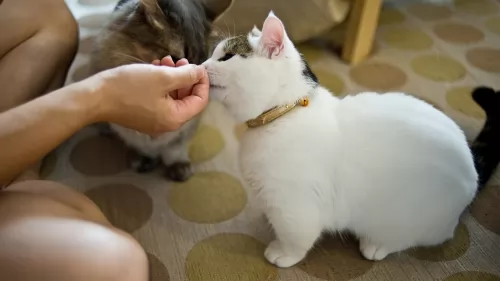 Every cat is unique and the Munchkin is a unique cat, This little cat is a carnivore just like any other cat and his diet must be made up mostly of protein.
Every cat is unique and the Munchkin is a unique cat, This little cat is a carnivore just like any other cat and his diet must be made up mostly of protein.
Speak to your vet about the best food for your Munchkin because a kitten will require a different diet to a senior Munchkin. Also, you don’t want your Munchkin to put on too much weight as this can be detrimental to his joints.
Not only that, being overweight comes with all kinds of health issues. The manufacturers of commercially manufactured cat foods have made sure that they have brought out foods for every stage of a cat's life and age.
Munchkin cats will need to have their fur brushed at least once a week. Trim the claws at the same time.
Provide your sweet little Munchkin with a litter box and keep the litter box immaculately clean, removing the feces every single day.